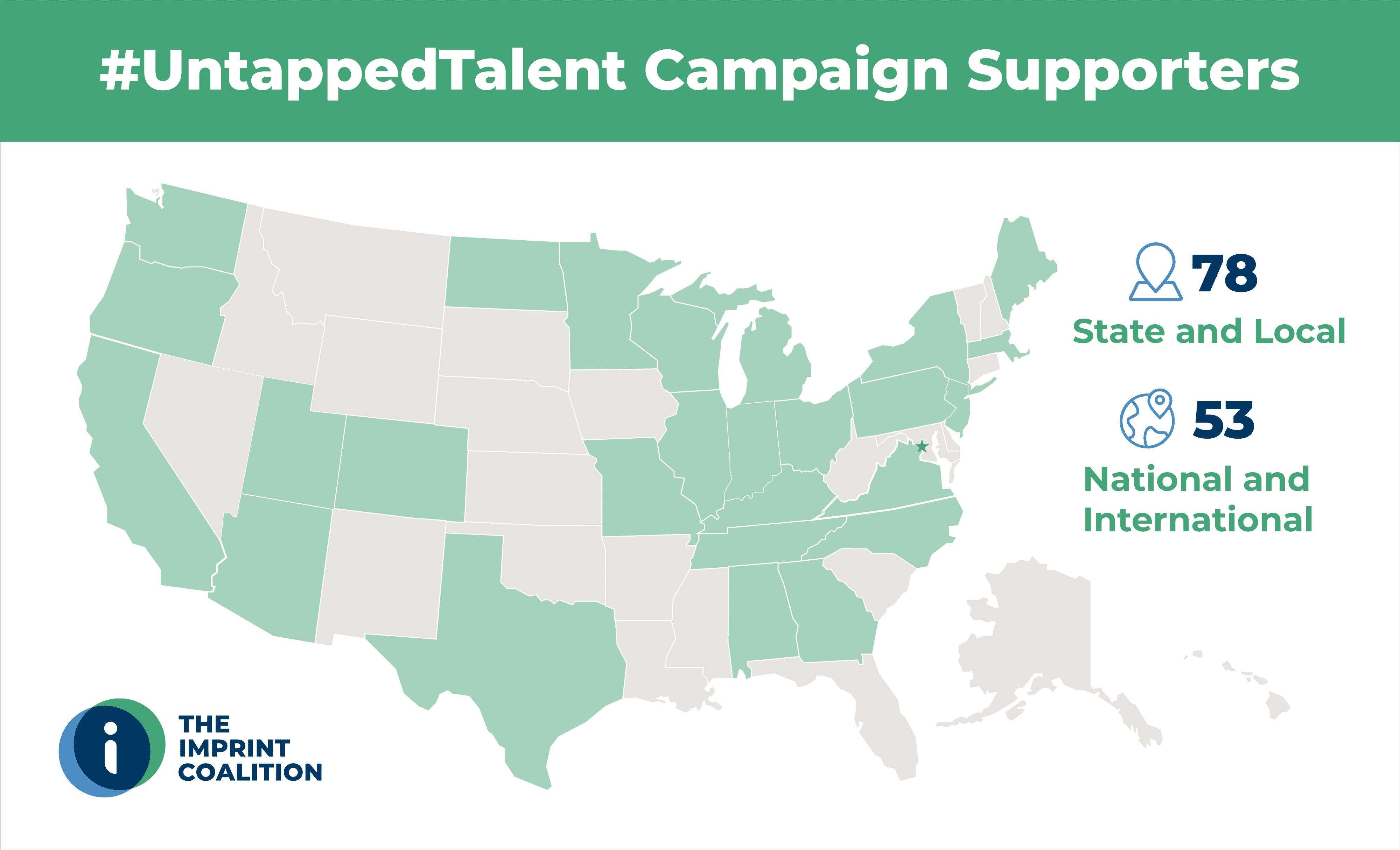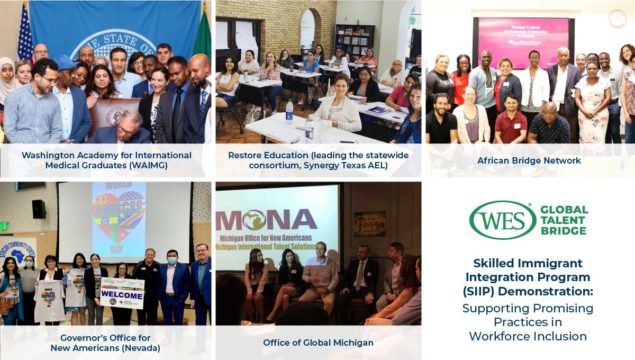This week, the IMPRINT Coalition concluded the #UntappedTalent campaign – IMPRINT’s first national awareness-raising initiative to advance policy reforms that are inclusive of immigrant and refugee workers in the United States. Since September 2021, the campaign has received overwhelming support from more than 130 organizations, including 23 international, 30 U.S. national, and 78 local organizations in 27 states across the U.S.
Through the #UntappedTalent campaign, IMPRINT collaborated with partner organizations to highlight stories of immigrants and refugees—like Lubab Al-Quraishi, a Refugee Congress Honorary Delegate and licensed pathologist with 18 years of experience in Iraq who was forced to flee her country under dire humanitarian circumstances. Lubab explained that seeking safety in the U.S. came at the cost of her career. Barriers to licensure, including laws that failed to recognize credentials obtained in another country, prevented her from working as a doctor in the U.S. To support herself and her family, Lubab took a job at a restaurant drive-through. “There are many people like me – hundreds of thousands of us with the necessary credentials and education — who are ready to work. Until the U.S. government acts, none of our experiences matter here,” she said. Lubab is organizing internationally trained immigrant and refugee physicians to call for alternative pathways for individuals with credentials from other countries to resume their professions in the U.S.
Highlighting the Need for Reform
“Immigrants and refugees—many of whom are people of color—hold the necessary languages and cultural capital that can address existing inequities when it comes to access to critical services, like health care.”
The #UntappedTalent campaign highlighted long-standing practices that led to inequitable outcomes, according to Dr. Mohamed Khalif, IMPRINT steering member and a Somali-born, Chinese-trained physician who founded the Washington Academy for International Medical Graduates (WAIMG). “Immigrants and refugees—many of whom are people of color—hold the necessary languages and cultural capital that can address existing inequities when it comes to access to critical services, like health care. Yet limited recognition of credentials and lack of investments in workforce development continue to prevent people like Lubab Al-Quraishi from resuming their professions,” Mohamed said. According to the Migration Policy Institute, gender, race, ethnicity, and immigration status are factors that disproportionately affect employment. For example, Black immigrants and immigrants from Latin America and other Spanish-speaking countries who have a bachelor’s degree or higher are more likely to experience underemployment. In terms of gender, women immigrants are far more likely to be underemployed than men with the same credentials. This disparity increases even more for women with children younger than five.
Tiziana Rinaldi, founder and CEO of the JobUp, further elaborated, “Many people don’t have an informed perspective on how the U.S. labor market responds to immigrants and refugees who hold credentials from another country.” Tiziana noted that the JobUp joined the #UntappedTalent campaign to shed light on systemic challenges that prevent immigrants and refugees from resuming their careers in the U.S. “I had to participate in the campaign—I’m a journalist and an educator. It was too important to remain silent,” she added.
Mobilizing for Change
The campaign mobilized more than 200 institutions, representing non-profit, higher education, and government sectors, and contacted 70 U.S. senators during its Week of Action to garner support for the Bridging the Gap for New Americans Act, one of the campaign’s key federal legislative priorities. The measure passed Congress with bipartisan support and was signed into law in 2022. The Bridging the Gap for New Americans Act calls on the Department of Labor to study the factors impacting employment of internationally trained immigrants and refugees in the U.S. and to issue recommendations for reform. The study will also include an analysis of public and private resources available to internationally trained immigrants and refugees seeking employment in their fields in the U.S.
The implications of the passage of the Bridging the Gap for New Americans Act are significant, said Jina Krause-Vilmar, IMPRINT steering member and president and CEO of Upwardly Global. “The Department of Labor’s findings have the potential to encourage greater public investment in providing professional entry support to immigrants and to increase access to community colleges. These reforms could be game-changing for our economy and life-changing for immigrants and refugees, as well as our communities.”
Looking Ahead
“There is growing awareness of the need for reforms so that every immigrant and forcibly displaced person receives the recognition they deserve, can contribute their expertise, and meaningfully access economic opportunity.”
There is momentum for reform. More than 1.2 million immigrants and refugees with credentials earned abroad are unemployed or underemployed in the U.S. “To build an equitable workforce, the campaign provided a platform for workers who are directly impacted to share their stories and lead conversations that are critical in advancing workforce development policies,” said Jacki Esposito, director of the IMPRINT Coalition and U.S. policy and advocacy at World Education Services (WES). “There is growing awareness of the need for reforms so that every immigrant and forcibly displaced person receives the recognition they deserve, can contribute their expertise, and meaningfully access economic opportunity.”
As IMPRINT concludes the #UntappedTalent campaign, the coalition is gearing up its work in 2023 to continue raising awareness about issues affecting internationally trained immigrants and refugees while advocating systemic reform.



